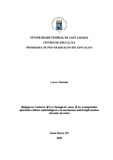| dc.creator | Visentini, Lucas | |
| dc.date.accessioned | 2021-11-26T13:30:56Z | |
| dc.date.available | 2021-11-26T13:30:56Z | |
| dc.date.issued | 2020-09-24 | |
| dc.identifier.uri | http://repositorio.ufsm.br/handle/1/23007 | |
| dc.description.abstract | This research deals with the epistemic-theoretical-methodological perspective proposed by the Biology of Knowing and the Biology of Loving, by Humberto Maturana et al. With the accomplishment of the study we aimed to investigate the contributions of the understandings of epistemic-theoretical-methodological nature presented by the Biology of Knowing and by the Biology of Loving, by Maturana et al., to the Educational Sciences. Furthermore, we intended to investigate the implications of an epistemic-theoretical-methodological nature of the concepts of the Biology of Knowing and the Biology of Loving for the achievement of the autotransformative students-teachers movements; to know the key categories concerning the Biology of Knowing and the Biology of Loving that can enable personal-professional development student-teacher in the flow of our daily living-coexistence and, also, analyzing, from the assumptions of the Biology of Knowing and Biology of Loving, as the love emotion - the affectivity, the lovingness - can be significant in relation to the teaching-learning processes. The study is of a qualitative nature (JOSSO, 2004; 2010) and was woven into five different investigative movements. As an element of the sources used for the construction of knowledge, we highlight bibliographic research (SEVERINO, 2016) and as a tool for data analysis, Discursive Text Analysis was used (MORAES, 2003). Regarding the epistemic-theoretical perspective, we present some categories and their respective authors: Biology of Knowing and Biology of Loving (MATURANA, 1998; 1999; 2000; 2001; 2004), (MATURANA; DÁVILA, 2015); cultural biology (MATURANA; DÁVILA, 2015), (MATURANA; VARELA, 2010); human formation (MATURANA; REZEPKA, 2000), (JOSSO, 2004; 2010); teaching (ARROYO, 2011), (BARCELOS, 2013; 2015; 2016); neuroscience, learning and education (COSENZA; GUERRA, 2011), (SHONKOFF; PHILLIPS, 2000); self-transformation (VISENTINI, 2014; 2019; 2020). Based on the knowledge built and the reflections carried out up to the present moment, the propositions of the Biology of Knowing and Biology of Loving, by Maturana et al., present themselves as true ruptures, epistemic-theoretical-methodological transgressions, with consequences for the achievement of autotransformative student-teacher movements. | eng |
| dc.language | por | por |
| dc.publisher | Universidade Federal de Santa Maria | por |
| dc.rights | Attribution-NonCommercial-NoDerivatives 4.0 International | * |
| dc.rights.uri | http://creativecommons.org/licenses/by-nc-nd/4.0/ | * |
| dc.subject | Biologia do conhecer | por |
| dc.subject | Biologia do amar | por |
| dc.subject | Maturana | por |
| dc.subject | Educação | por |
| dc.subject | Afetividade | por |
| dc.subject | Biology of knowing | eng |
| dc.subject | Biology of loving | eng |
| dc.subject | Education | eng |
| dc.subject | Affectivity | eng |
| dc.title | Biologia do conhecer (BC) e biologia do amar (BA): transgressões epistêmico-teórico-metodológicas e os movimentos autotransformativos discentes-docentes | por |
| dc.title.alternative | Biology of knowing and biology of loving: epistemic-theoretical-methodological transgressions and the autotransformative students-teachers movements | eng |
| dc.type | Tese | por |
| dc.description.resumo | Esta pesquisa versa sobre a perspectiva epistêmico-teórico-metodológica proposta pela Biologia do Conhecer e pela Biologia do Amar, de Humberto Maturana et al. Com a realização do estudo objetivamos investigar as contribuições das compreensões de natureza epistêmico-teórico-metodológicas apresentadas pela Biologia do Conhecer e pela Biologia do Amar, de Maturana et al., às Ciências da Educação. O estudo realizado está vinculado ao Programa de Pós-Graduação em Educação (PPGE), LP1 – Docência, Saberes e Desenvolvimento Profissional da Universidade Federal de Santa Maria (UFSM). Outrossim, intentamos investigar as implicações de natureza epistêmico-teórico-metodológicas das concepções da Biologia do Conhecer e da Biologia do Amar para a consecução dos movimentos autotransformativos discentes-docentes; conhecer as categorias-chave concernentes à Biologia do Conhecer e à Biologia do Amar que podem possibilitar desenvolvimento discente-docente no fluir de nosso viver-conviver cotidiano e, também, analisar, a partir dos pressupostos da Biologia do Conhecer e da Biologia do Amar, como a emoção amor – a afetividade, a amorosidade – pode ser significativa em relação aos processos de ensino-aprendizagem. O estudo é de natureza qualitativa (JOSSO, 2004; 2010) e foi tecido em cinco diferentes movimentos investigativos. Como elemento das fontes utilizadas para a construção de conhecimentos, destacamos a pesquisa bibliográfica (SEVERINO, 2016) e como possibilidade de análise das informações foi utilizada a Análise Textual Discursiva (MORAES, 2003). Em relação à perspectiva epistêmico-teórica, apresentamos algumas categorias e seus respectivos autores: Biologia do Conhecer e Biologia do Amar (MATURANA, 1998; 1999; 2000; 2001; 2004), (MATURANA; DÁVILA, 2015); biologia cultural (MATURANA; DÁVILA, 2015), (MATURANA; VARELA, 2010); formação humana (MATURANA; REZEPKA, 2000), (JOSSO, 2004; 2010); docência (ARROYO, 2011), (BARCELOS, 2013; 2015; 2016); neurociência, aprendizagem e educação (COSENZA; GUERRA, 2011), (SHONKOFF; PHILLIPS, 2000); autotransformação (VISENTINI, 2014; 2019; 2020). A partir dos conhecimentos construídos e das reflexões realizadas, concluímos que as proposições da Biologia do Conhecer e Biologia do Amar, de Maturana et al., se apresentam como importantes rupturas, transgressões de natureza epistêmico-teórico-metodológicas, com consequências para a consecução dos movimentos autotransformativos discentes-docentes. | por |
| dc.contributor.advisor1 | Barcelos, Valdo Hermes de Lima | |
| dc.contributor.advisor1Lattes | http://lattes.cnpq.br/7447760896466057 | por |
| dc.contributor.referee1 | Scott Júnior, Valmor | |
| dc.contributor.referee2 | Veiga, Adriana Moreira da Rocha | |
| dc.contributor.referee3 | Maders, Sandra | |
| dc.contributor.referee4 | Azzolin, Maria Aparecida Nunes | |
| dc.creator.Lattes | http://lattes.cnpq.br/6308292117036145 | por |
| dc.publisher.country | Brasil | por |
| dc.publisher.department | Educação | por |
| dc.publisher.initials | UFSM | por |
| dc.publisher.program | Programa de Pós-Graduação em Educação | por |
| dc.subject.cnpq | CNPQ::CIENCIAS HUMANAS::EDUCACAO | por |
| dc.publisher.unidade | Centro de Educação | por |



